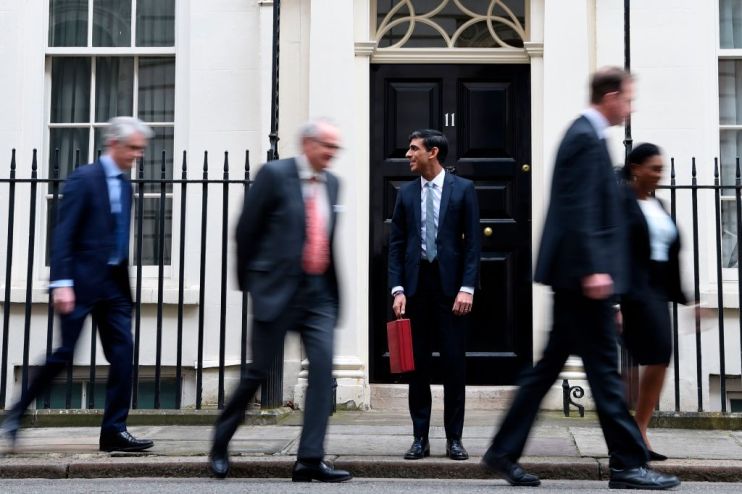Now’s not the time to worry about £500bn of borrowing, says IFS

The UK’s budget deficit could balloon to £350bn this year and £150bn the next, but tax rises or spending cuts to tackle the public debt should not be implemented “any time soon,” the Institute for Fiscal Studies (IFS) has said.
However, IFS boss Paul Johnson warned that the chancellor was spending huge amounts and that there must eventually be a “reckoning”. He said that would most likely be “in the form of higher taxes” after a decade of austerity.
Read more: Rishi Sunak says he will deal with debt levels once picture clears
It comes the day after chancellor Rishi Sunak splashed an extra £30bn to try to stimulate the UK’s coronavirus-ravaged economy. It came in the form of job retention schemes and tax cuts.
Sunak said he was “unencumbered by dogma”. He also suggested he would do more in the autumn to protect jobs and businesses.
The IFS, a respected think tank that analyses taxing and spending, today said the budget deficit could well reach £350bn this year, with the government having spent around £190bn on coronavirus this year. The deficit is the gap between government revenue and its spending.
Carl Emmerson, IFS deputy director, cautioned there was “huge uncertainty” around the figures. But experts reckon the deficit this year could reach around 18 per cent of GDP. That is more than double its level following the financial crisis.
And Emmerson said the UK could well borrow another £150bn next year to cover the deficit, taking the total for the two years to £500bn.
No need for new fiscal rules – yet
Such massive levels of borrowing have unnerved some Conservative MPs.
Former chancellor Sajid Javid, who was replaced by Sunak in February, yesterday urged the chancellor to lay out a new set of taxing and spending rules with the aim of bringing down the government debt.
Yet the IFS today slapped down such suggestions. Emmerson said: “What we don’t need is a new set of fiscal rules.”
“We keep introducing fiscal rules that are badly designed. They’re not constraining enough during good periods, they’re far too inflexible during adverse shocks.”
Yet Emmerson said the chancellor should have a plan to show he has considered the risks around the debt. “If interest rates stay low then the debt is fine.”
Read more: Rishi Sunak Summer Statement: All the Chancellor’s spending pledges
“What we’ve got to worry about is a world where interest rates go up and that’s not accompanied by stronger growth.”
Sunak this morning told the BBC: “We can’t sustainably live like this.” He added: “As soon as we have a clearer path… we can look at the situation and make sure that our public finances are back on a sustainable footing over a reasonable period of time.”
Emmerson said: “It’s going to take decades before we manage that debt down to the levels we were used to pre this crisis.”
IFS queries Sunak’s job retention bonus
The IFS said the chancellor’s £30bn package was “focussed on the right things, such as jobs for the young”. Yet it questioned whether some of the schemes were efficient uses of money.
For example it said a lot of the spending on the job retention bonus scheme would be “deadweight” as it would go to firms who would have brought back furloughed workers anyway.
Under the programme, companies will receive a one-off payment of £1,000 per worker that they bring back from furlough until the end of January.
IFS head of work and income Robert Joyce said it is “a lot less than we have been providing through the furlough scheme so far”. He said it remains to be seen whether it will work.
Business groups have warned that millions of jobs are still at risk.
Adam Marshall, director general of the British Chambers of Commerce, said Sunak still needs to address “the ticking clock on a number of other key concerns – including the impending end of key business loan scheme”.
VAT cut is ‘poorly targeted’
Sunak also slashed VAT for the hospitality and tourism industries to five per cent from 20 per cent until the end of January.
Helen Miller, the IFS’s head of tax, said it will increase output in the sector if firms have the capacity to serve more people with social distancing measures in place.
Yet she said in many ways it is a “poorly targeted giveaway”. For example, hospitality and tourism firms who were already in a stronger position stand to benefit the most.
IFS chief Johnson said he expected the chancellor’s autumn Budget to “still to be looking to support a recovery”.
“We will know more then about the progress of both the virus and the economy. This should allow for more targeted support.”